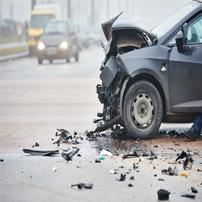Philadelphia Car Accident Lawyers Discuss Increases in Traffic Fatalities
August 15, 2016 The National Highway Traffic Safety Administration (NHTSA) recently reported an almost eight percent increase in traffic fatalities in the past year. While lower gas prices and faster speed limits on interstate highways across the country have contributed to this increase, human error still accounts for 94% of all fatal car accidents. NHTSA officials are pushing for car manufacturers to develop more automated crash resistant technology to help lower the number of fatal car accidents on American roadways.
The National Highway Traffic Safety Administration (NHTSA) recently reported an almost eight percent increase in traffic fatalities in the past year. While lower gas prices and faster speed limits on interstate highways across the country have contributed to this increase, human error still accounts for 94% of all fatal car accidents. NHTSA officials are pushing for car manufacturers to develop more automated crash resistant technology to help lower the number of fatal car accidents on American roadways.
Over 35,000 fatal car accidents occurred in 2015, which was a 7.7% increase over 2014. This total included fatalities from automobile accidents as well as pedestrian accidents, bicycle accidents, and motorcycle crashes, which increased as much as 13% from the previous year. Fatal car accidents involving young drivers rose 10% in just one year while fatalities involving large commercial trucks rose four percent over last year.
Analysts attribute the increased rate of fatalities to several factors, most notably the present economy. As gas prices have plummeted over the past 12 months and the unemployment rate has dropped, more and more people are taking to the roadways. Young, inexperienced drivers especially are more prone to drive as they join the workforce and can afford lower gas prices.
The Insurance Institute for Highway Safety (IIHS) reported that an estimated 1,900 traffic deaths were the direct result of speeding in 2014, mainly on interstate highways where speed limits have increased an average of 10 miles per hour over the past year. Collisions occurring at speeds above 55 miles per hour can have devastating consequences. Drivers on interstate highways with a posted speed limit of 65 or 70 miles per hour often exceed those limits, which results in catastrophic casualties when vehicles collide or run off the road.
Is New Technology Needed?
The most vital recommendation from the National Transportation Safety Board (NTSB) calls for an increase in the development of more automated crash resistant technology on new vehicles. According to a spokesperson from the NTSB, development of onboard technology that will compensate for human error is the first step in reducing the number of fatalities on our roadways each year. Automobile manufacturers are working hard on developing self-driving vehicles, but we are years away from them becoming the standard. In the meantime, installing just some of the features of these automated cars on new vehicles can help reduce the chance of driver error that leads to fatal traffic accidents.
Other suggestions from the NHTSA include tighter enforcement of speed limits, public education on the dangers of drunken driving and distracted driving, and higher visibility of law enforcement officers on our roadways and highways. These tactics resulted in a 25% decrease in traffic fatalities between the years of 2005 and 2014, with a record low of reported casualties in the year 2011.
Philadelphia Car Accident Lawyers at Galfand Berger LLP Help Victims of Car Accidents Claim Compensation
A car accident can result in serious and sometimes fatal injuries that quickly devastate a family’s financial and emotional health. If you or someone you know has been injured or lost their life in a car accident, the experienced and knowledgeable Philadelphia car accident lawyers at Galfand Berger LLP can help you claim the compensation you may be entitled to receive.
Call us at 1-800-222-USWA (8792), or contact us online to schedule a consultation today. Our offices are conveniently located in Center City Philadelphia and we proudly serve clients throughout Pennsylvania and New Jersey.
 Google Screened
Google Screened
